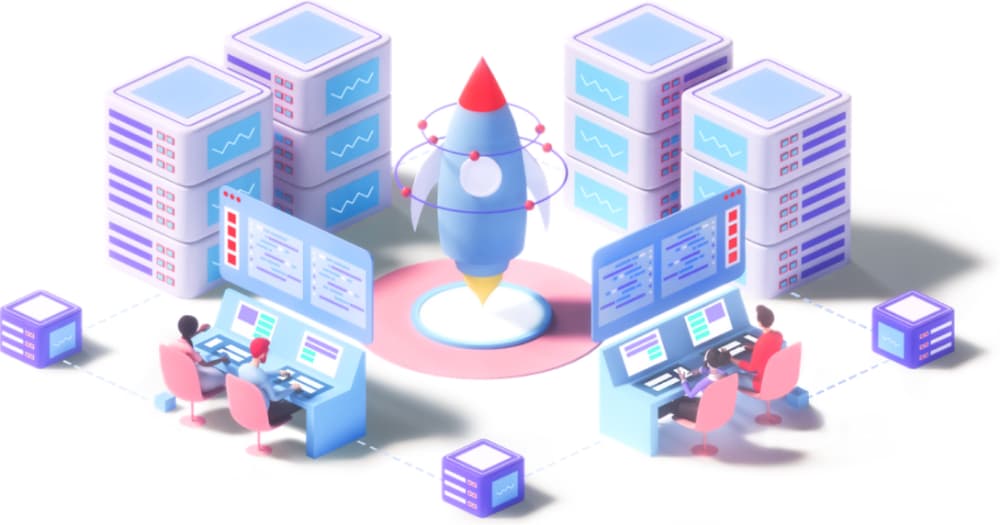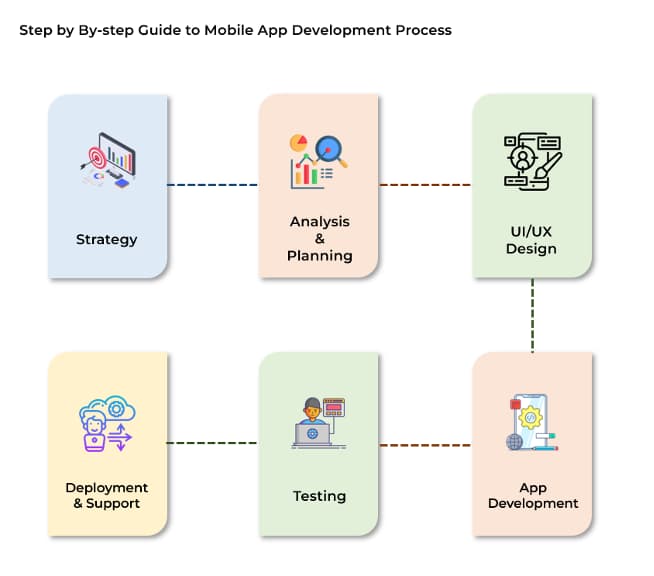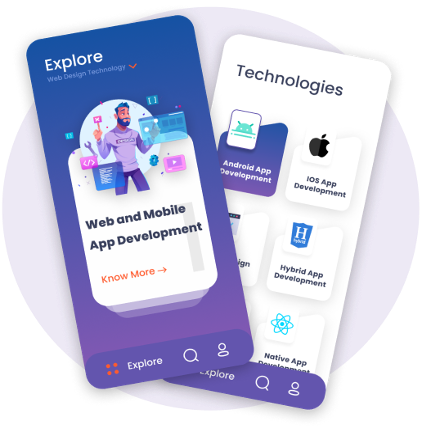table of content
- Introduction
- What is Mobile App Development?
- Purpose of Mobile App Development
- Types of Mobile App Development
- Step by By-step Guide to Mobile App Development
- Why is App development important for business?
- Be innovative
- Personalize the user experience
- Increase Accessibility
- Provide More Value to the Customer
- Increased Sales
- Enhance Brand Recognition
- Improve Communication
- Unique Payment & Services
- How Mobile Apps are Impacting Industries?
- Future Trends of Mobile Applications
- How CodeStore Technologies Helps You to Stay Ahead with Mobile App Trends?
- FAQs
Mobile Application Development for Your Business

Introduction
Whether you’re a budding startup or an established enterprise, the power of mobile apps in today’s digital age is undeniable. Mobile applications are no longer just a trend – they are revolutionizing how we interact with businesses, from retail shops and hospitals to educational institutions and transport services.
With billions of apps downloaded each year, businesses now have an unprecedented opportunity to connect with a global audience. Statista projects that by 2026, Google Play Store downloads will surge to 143 billion (a 30% increase from 2021), while Apple App Store downloads will reach 38 billion (a 15% rise).
At CodeStore Technologies, we empower startup founders and business leaders to leverage mobile apps to deliver seamless user experiences and make lasting impressions on their customers. If you’re wondering how mobile application development can propel your business forward, this blog will guide you through its immense potential.
What is Mobile App Development?
Mobile app development is the process of creating software applications for mobile devices like smartphones and tablets.
Mobile apps can be: –
- Pre-installed on device
- Downloaded from the mobile app store
- Access through a mobile web browser
Mobile apps can benefit businesses by enhancing their brand, improving customer connection, boosting engagement, and offering a personalized marketing channel.
Purpose of Mobile App Development
The primary goal of mobile application development is to deliver genuine value to customers through task simplification, quality entertainment, and problem-solving. A valuable app is one that users engage with daily, enhancing their lives in meaningful ways. For businesses seeking purposeful app development, this is a strategic decision.
According to Statista, the mobile app market is projected to grow at a CAGR of 8.83% from 2022 to 2027, reaching a value of USD 673.809 billion by 2027. This expanding market supports mobile app development for businesses utilizing smartphones and tablets on Android and iOS platforms.
Types of Mobile App Development
Choosing the right type of mobile app can significantly impact your business’s success and user experience. Let’s explore the three most popular options:
- Native: Native applications use platform-specific languages like Swift or Kotlin and are created especially for one platform (iOS or Android). They offer complete access to the device’s functionalities, seamless UI/UX, and quick performance. Ideal for applications like banking or gaming that require great performance and excellent user experience.
- Web: Web apps do not require installation and operate within web browsers. They were created with HTML, CSS, and JavaScript and are inexpensive and simple to maintain. While they lack complex features and offline capacity, they are ideal for businesses wishing to reach a larger audience with a less mobile application development cost, such as news portals or content-sharing apps.
- Hybrid: Web and native app best practices are combined in hybrid apps. They are built with frameworks such as Flutter or React Native and work across various platforms using a single codebase. They are less expensive than native apps, have faster development times, and provide respectable performance. It is best suited to startups or businesses that require a quick market entry.
Step by By-step Guide to Mobile App Development

The process of developing a mobile app is structured. Every step of the process, from planning to deployment, is essential to producing top-notch software that satisfies user expectations and corporate objectives. Let’s discuss every step briefly:
- Planning: Determine your app’s objective, target audience, and key features. Set a defined timetable, budget, and goals to ensure the success of your development.
- Analysis and Planning: Analyze competitors and conduct market research. Create an accurate roadmap, select the right tech stack, and define the development strategy to achieve project alignment.
- UI/UX Design: Create smooth user experiences and intuitive user interfaces. Prioritize wireframes, prototypes, and graphic design to improve your target users’ usability and engagement.
- App Development: Use the tech stack of your choice to develop the front-end and back-end. Follow agile approaches to ensure scalability and performance while developing efficiently.
- Testing: Conduct rigorous testing to identify bugs and ensure functionality, performance, and security. Perform multiple tests like unit, integration, and user acceptance testing.
- Deployment and support: Install the app from the app stores. Over time, add features, address problems, and raise customer satisfaction by offering regular maintenance, updates, and support.
Why is App development important for business?
Mobile app development empowers businesses to expand their customer base, enhance engagement, and stay competitive. A 2018 Clutch survey revealed that 42% of small businesses already have a mobile app, while 30% plan to develop one. This trend underscores the growing importance of mobile apps. Here are key reasons why app development is crucial for businesses:
Be innovative
Mobile app development puts your business at the forefront of modern technology. Customers will perceive your brand as current, flexible, and forward-thinking if it is well-designed and shows that your business follows the newest technological developments.
Personalize the user experience
Mobile apps provide personalized experiences that increase user engagement and happiness through recommendations, adaptable interfaces, and specialized content, promoting loyalty and customer loyalty.
Increase Accessibility
Mobile applications are vital for enhancing business functions, allowing companies to quickly inform customers about updates related to services and products. This fosters strong relationships and builds trust with clients.
Provide More Value to the Customer
The development of mobile applications allows for the digital transformation of customer loyalty programs, enhancing the overall business experience by meeting customer expectations regarding products and services.
Increased Sales
Mobile apps enhance sales and brands by delivering a convenient experience for customers. They allow businesses to boost engagement and revenue through price-based models for browsing and purchasing products and services.
Enhance Brand Recognition
Mobile application development is a keyway to boost brand visibility. It’s like having a customizable billboard at your fingertips-stylish, eye-catching, practical, and informative. This accessibility encourages visitors to engage actively in purchasing branded products or using services through mobile apps.
Improve Communication
Mobile applications enable users to collaborate and communicate interactively through gamification, social features, multimedia, and feedback.
Unique Payment & Services
Mobile apps come with specialized features tailored to different industries. For instance, service-oriented sectors such as healthcare, spas, and salons benefit from apps that enable customers to book appointments easily. Today, mobile payments are the preferred payment method. Businesses can incorporate payment options into their apps, allowing users to make direct transactions using debit and credit cards.
How Mobile Apps are Impacting Industries?
Here are key industries that can benefit from mobile application development, enhancing customer experience. Let’s briefly explore the advantages for businesses.
- Healthcare: Managing appointments, addressing patients seeking diagnoses, and timely delivering health tips and updates can be overwhelming in the healthcare industry. App development can enhance patient care by enabling remote consultations with healthcare providers, improving access to medical services. Additionally, it allows individuals to monitor fitness goals, track medications, and manage chronic conditions. Key features like appointment scheduling streamline the booking process for both patients and healthcare professionals.
- Media & Entertainment: Creating a mobile app for the entertainment industry enables entrepreneurs to provide on-demand access to movies, TV shows, music, short videos, and podcasts, along with interactive features like live streaming and messaging. This can enhance modern solutions and create new revenue opportunities for popular apps like Netflix, Instagram, and YouTube.
- Banking & Finance: Application development for banks helps customers manage their accounts, transfer funds, pay bills online, and more. Additionally, banks can enhance the customer experience with security features like biometric authentication for safe transactions and personal finance management tools to track expenses, set budgets, and plan savings.
Future Trends of Mobile Applications
The future of mobile application development promises groundbreaking advancements. Below are the key trends that will shape how businesses and users interact with mobile apps in the coming years.
- Augmented reality (AR) and virtual reality (VR): These technologies enable users to engage with computer-generated images in the real world or to immerse themselves in virtual environments, as seen in Pokémon Go, Google Maps, Snapchat, and IKEA Place.
- Blockchain technology: This technology leverages a decentralized, secure network for data storage and transactions, enhancing security, streamlining processes, and increasing transparency.
- Beacon technology: This location-based system utilizes Bluetooth signals to deliver targeted content to nearby devices, suggesting nearby services based on their location.
- Internet of Things (IoT) & Cloud-based solutions integration: IoT and cloud integration in mobile apps enable mobile application developer to create innovative solutions, such as industrial automation, smart home systems, healthcare monitoring, and environmental tracking. This integration paves the way for a smarter future, catering to the growing demand for IoT devices among businesses and individuals alike.
- Artificial Intelligence & Machine Learning Implementation in Mobile Apps: The artificial intelligence industry has transformed mobile apps, with AI-powered chatbots enhancing customer experience and machine learning algorithms facilitating speech recognition, language processing, and image recognition across various sectors.
How CodeStore Technologies Helps You to Stay Ahead with Mobile App Trends?
CodeStore is an offshore custom software development company based out of India. Our expertise lies in creating high-quality, innovative custom software solutions for businesses of all sizes.
We prioritize your app’s user experience through our exceptional development practices. We have assisted various startups in enhancing their business through our digital product development.
What are you waiting for? Get in touch with our expert Now to discuss your app idea and get started!

FAQs
How can mobile app development help my business?
Mobile apps improve accessibility, simplify processes, and increase client engagement. They provide tailored experiences and increase brand recognition, which eventually drives growth and raises customer satisfaction.
Is it worth it to build a mobile app for my business?
Yes! Mobile apps can provide business with a competitive edge, increase consumer loyalty, and broaden your reach. They boost revenue prospects, promote your business, and enable real-time engagement.
How to develop an app for business?
Start by planning your app’s purpose and features. Choose a development approach (native, hybrid, or web), hire our skilled developers, and follow a structured process from design to deployment.
How do I hire an app developer for my business?
Look for developers with proven experience, strong portfolios, and client reviews. Ensure they understand your industry and deliver scalable, user-friendly solutions. Look no further, when you can choose CodeStore for expert development services!
Why is mobile app development crucial for businesses in today’s digital era?
Mobile apps improve customer engagement, streamline services, and boost accessibility. In a digital-first world, apps keep you connected with customers and ahead of competitors.
How long does it take to develop a mobile app?
App development typically takes 8 months to a year or longer to build. It eventually depends on complexity, features, and platforms. Simple apps are quicker; complex, feature-rich apps take longer.
What is the cost of developing a mobile app?
mobile application development cost varies based on features, platforms, and development time. Simple apps range from $10,000-$50,000; complex apps can exceed $100,000.
What platforms should my business app support: iOS, Android, or both?
Choose based on your target audience. Supporting both iOS and Android ensures maximum reach and customer engagement. Hybrid apps can offer cost-effective, cross-platform solutions.
Will my app be compatible with future updates and devices?
Yes, with regular updates and maintenance. Ensure developers follow best practices to future-proof your app for new devices, OS updates, and evolving technologies.



